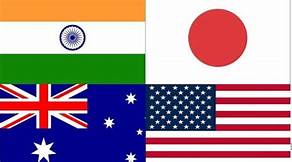QUAD SUMMIT – OUTCOMES
QUAD SUMMIT – OUTCOMES

NEWS : The first in-person summit of the Quad powers — Australia, Japan, India and the United States — was concluded recently
OUTCOMES
Practical cooperation focus areas
- Commitment to “a free and open Indo-Pacific, which is also inclusive and resilient”.
- Promoting security and prosperity in this region is the raison d’être of the Quad, a goal to be achieved through practical cooperation among the four powers.
- The Washington summit added new areas of collaboration: infrastructure; cybersecurity and space; education and people-to-people relations.
INFRASTRUCTURE
- On the first, the plan is to promote “sustainable infrastructure”, with a stress on aligning the Quad with the G7’s Build Back Better World (B3W) Partnership, based on the G20’s quality infrastructure investment principles.
- Quad can focus on four key B3W elements: digital connectivity, climate, health security and gender equality infrastructure.
- No mention of any specific projects or countries where they are envisaged. However, the formation of an infrastructure coordination group composed of senior officials was announced. It will map and coordinate infrastructure needs and catalyse private-sector investment.
CYBERSECURITY
- Cooperate on combating cyber threats and securing critical infrastructure.
- Identify new collaboration opportunities, especially sharing of data to monitor climate change, disaster response and preparedness, and sustainable uses of ocean and marine resources.
- A senior cyber group and a new working group on space will be established.
EDUCATION: On education, the Quad fellowship programme will award 100 graduates — 25 scholars from each Quad country — opportunities in leading STEM (Science, technology, engineering, and mathematics) programmes in the U.S. This is not a government programme but a philanthropic initiative.
CLIMATE CHANGE
- Focused on three thematic areas: climate ambition, clean-energy innovation, and climate adaptation and resilience.
- Emphasised enhanced action for achieving global net-zero emissions preferably by 2050, with an important caveat — “taking into account national circumstances” — added at India’s instance.
- A Quad shipping task force has now been launched to build a green-shipping network and green port infrastructure.
CRITICAL AND EMERGING TECHNOLOGIES
- A slew of steps is under consideration relating to 5G and beyond 5G networks; supply chains of critical minerals including semiconductors; and emerging advances in biotechnology.
- To be successful, building the supply chains will need expert resources and coordination from each country.
- A contact group on Advanced Communications and Artificial Intelligence will focus on standards-development and foundational research.
BENEFITS
- Maritime security will continue to be strengthened through bilateral 2+2 Ministerial tracks; the four-powers Malabar Exercise; and other bilateral or trilateral arrangements such as AUKUS (the new trilateral security pact between Australia, the United Kingdom and the U.S.).
- Defence cooperation will not be lowered in priority; it will just be handled differently. The Quad wants a positive orientation, rather than be seen as an ‘Asian NATO’.
- Regionally, the Quad sees the Association of Southeast Asian Nations (ASEAN) as “the heart of the Indo-Pacific region”. Together with the small island States in the South Pacific, ASEAN countries will stand to benefit from growing cooperation within the Quad. So will the European Union (EU), whose new EU Strategy for Cooperation in the Indo-Pacific was welcomed by the four leaders.
- On Afghanistan, the decision to “closely coordinate” policies and next steps will be watched as the U.S. comes under strong pressure to show flexibility towards the interim Taliban government.
IMPORTANCE TO INDIA : The institutionalisation of the Quad has begun to gather speed. For India, this grouping is critical. It is the first major plurilateral organisation in years where India is on the ground floor, an equal partner of the new P4. It has much to contribute and leverage, beyond its market. This is an opportunity for India to work with the advanced economies to “build habits of cooperation”, while confronting the 21st century challenges in its Indo-Pacific neighbourhood

